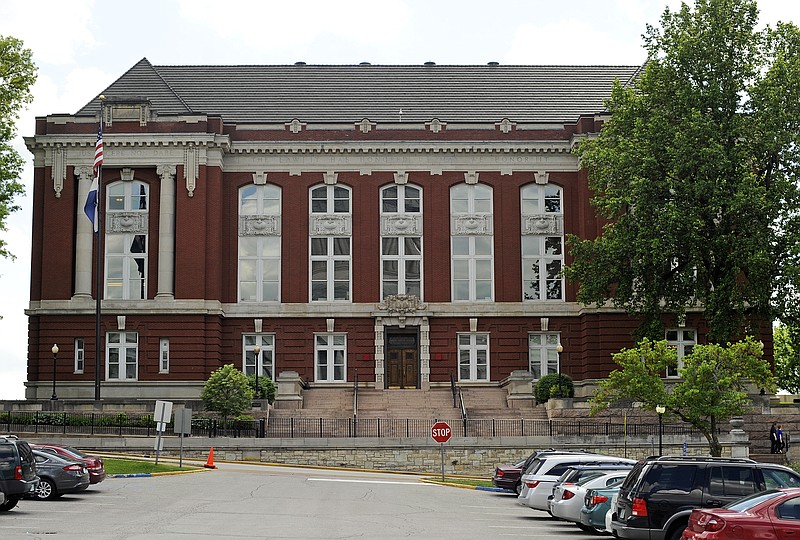Missouri's Supreme Court must decide whether a Dent County man should be executed or spend the rest of his life in prison after a St. Charles County jury convicted him of first-degree and second-degree murder for the December 2011 killings of his former lover and her new boyfriend in a child custody dispute.
Marvin Rice, a former police officer and deputy sheriff, was working for the state Corrections Department at the time of the murders on Dec. 10, 2011, near Salem.
Rice was arrested in Jefferson City after a shootout with officers at the Capitol Plaza Hotel. However, while mentioned during Wednesday morning's Supreme Court arguments, that portion of the case wasn't what the high court is currently considering.
He still faces Cole County charges, but no new trial dates have been set in the case, now scheduled to be held in Callaway County on a change of venue.
Rice's St. Charles trial on the murder charges was a change of venue from Dent County.
The jury found him guilty of first-degree murder for killing Annette Durham, who was the mother of Rice's child, and of second-degree murder for killing Steven Strotkamp, Durham's new boyfriend.
However, in the sentencing phase of Rice's trial, the jury didn't reach a final decision on whether Rice should be executed or sentenced to life in prison on the first-degree murder conviction.
So Circuit Judge Kelly Wayne Parker imposed the death penalty for Durham's murder and a life sentence for Strotkamp's killing.
Attorney Craig Johnston of the Missouri Public Defenders office argued Wednesday that Rice should get a new sentencing hearing, because "an experienced death penalty prosecutor in this case made a concerted effort to focus the jury's attention on the fact that Mr. Rice remained silent throughout the proceedings."
That's a violation of court procedures and of Rice's constitutional right not to testify, he noted.
"This court has repeatedly held that, where an objection is made and overruled, as happened here, a direct reference to the defendant's failure to testify will invariably result in a new trial," Johnston said.
Assistant Attorney General Nathan Aquino countered: "The record doesn't support that assertion" - although he acknowledged there were brief mentions during the trial of Rice being unwilling to answer investigators' questions.
Chief Justice Zel Fischer wondered if the state didn't have to prove that its comments about Rice were "harmless beyond a reasonable doubt."
Aquino said: "The theme here was that the defendant was obviously the one who committed the killings, and that his flight and everything else, demonstrated his consciousness of guilt."
Among other things, Aquino said, prosecutors in the original trial noted Rice not only killed his former lover and her new boyfriend, but "that these were egregious killings (and Rice), during his flight, tried to kill at least the officer at the hotel."
Aquino told the Supreme Court that Rice fired at least seven shots inside the hotel.
One of the issues before the court - and disputed by the parties - was the public defender's assertion that two members of the jury said in affidavits that the jurors had voted 11-1 for a life sentence rather than death.
Aquino said that information wasn't part of the official record, but the issue prompted several questions from the judges about how much weight they should give that information.
"I don't believe it's proper to impeach or pierce the jury's verdict," Aquino said.
Johnston acknowledged the law allows the judge to "start from scratch" when a jury doesn't reach a unanimous verdict, but argued that "makes the statute unconstitutional under the (federal) 6th and 8th Amendments," since the judge could make findings and issue a ruling based on information the jury never considered.
As usual, the high court didn't indicate when it might issue a ruling in the case.
Cole County charges pending
Meanwhile, Rice still faces Cole County's charges from the end of his flight from Dent County.
As he was heading north after the murders, officials were able to track Rice's location through a state-owned cellphone Rice had as a Corrections officer.
Law officers began to chase him in Osage County, and Jefferson City police put out spike strips to stop Rice's flight.
Eventually, Rice was forced to pull over, and he ran into the Capitol Plaza's parking lot, then into the building - where the Jefferson City Medical Group was holding a Christmas party for about 570 doctors, nurses, employees and their spouses.
Jefferson City Officer Curtis Bohanan II followed Rice into the hotel lobby, and Rice fired toward Bohanan, who returned the fire.
Cole County Sheriff's Deputy Christopher Suchanek was providing security for the JCMG party and, when he heard the disturbance, drew his gun and moved toward the gunfire.
Unable to see the gunman initially, Suchanek jumped a wall in the hotel's indoor courtyard, maneuvering until he spotted Rice, who was raising his weapon to fire again.
Suchanek shot Rice, causing him to drop his weapon and fall to the floor.
Bohanan and Suchanek then handcuffed Rice, who had been struck by rounds from both officers' weapons.
Bohanan and Suchanek were awarded the Missouri Medal of Valor by then-Gov. Jay Nixon in October 2012.
Rice was charged with three felonies - assault/attempted assault on a law enforcement officer, armed criminal action, and resisting arrest or detention by fleeing (while creating a substantial risk of serious injury or death to any person).
The case eventually was transferred to Callaway County on a change of venue, and has been scheduled twice for a trial, but then delayed.
New Cole County Prosecutor Locke Thompson said the case still is active.
"We are, of course, keeping close tabs on the Supreme Court arguments," he said. "However, (at) this time, nothing has been scheduled in the Callaway case."

